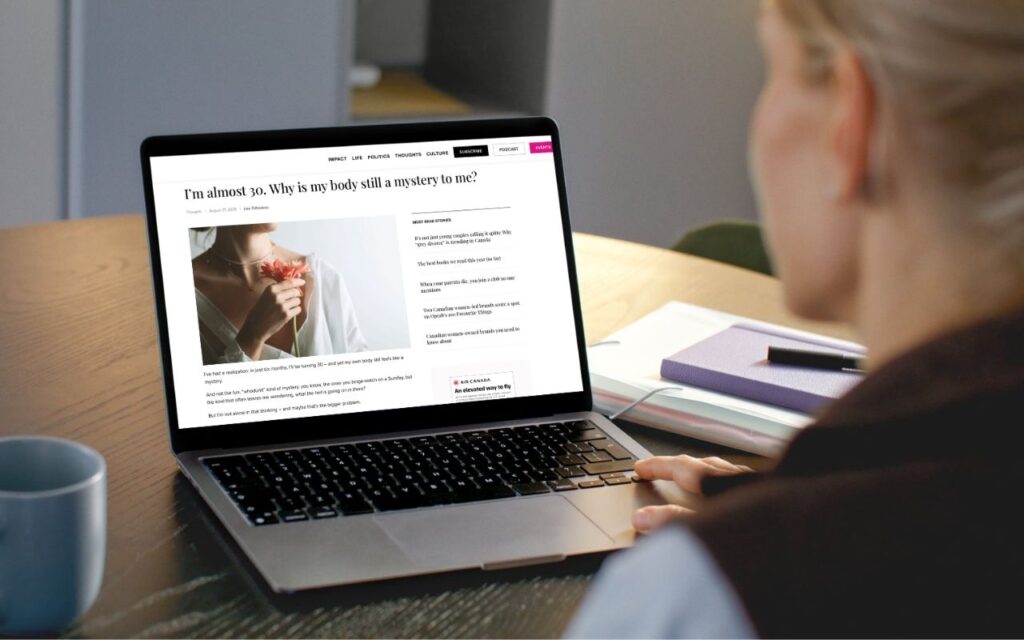Heart disease is the number one killer of women worldwide. That’s an alarming statistic, but the good news is that 80 per cent of heart disease is preventable.
Female heart attack statistics by age
According to the Canadian Women’s Heart Health Centre, the risk of developing heart disease can begin by the age of 20, and women are at increased risk of developing cardiovascular disease (CVD) as we age.
We asked Dr. Nazli Parast, Advanced Practice Nurse at the Women’s Heart Health & Hypertension Clinics at the University of Ottawa Heart Institute, to talk to us about how to protect our hearts, know the warning signs, and advocate for ourselves.
What are the risk factors for heart health issues?
To take care of your heart, you should know the risk factors — diabetes, smoking, high cholesterol, physical inactivity, obesity, stress, anxiety, and high blood pressure are key concerns. If you know you’re at high risk, you can take proactive action to reduce your chances of heart disease.
Women also have additional risk factors, says Dr. Parast. For example, the risk of cardiovascular disease increases after menopause and can be exacerbated by pregnancy-related complications such as gestational diabetes or hypertension, preeclampsia, premature delivery, or stillbirth.
And there’s something else on the list that may surprise some women, notes Dr. Parast.
A lot of people don’t know that being on birth control medication also potentially increases the risk.
Dr. Parast
The Canadian Women’s Heart Health Centre has information on all of these risk factors, along with simple steps you can take to help reduce your risk.
What are the symptoms of a heart attack in women?
Women’s heart attacks often manifest in different, subtler ways than men’s heart attacks. Sometimes, the warning signs pop up months before the actual attack, making them easy to brush off. Women might not even connect their back pain or fatigue to heart issues because it doesn’t fit their image of a typical heart attack.
The signs can be missed by medical professionals, too, with the Heart and Stroke Foundation determining that early signs of a heart attack were missed in 78 per cent of Canadian women.
So, here are some early warning signs of heart attack in women:
- Fatigue: About 70 per cent of women report unusual fatigue as their most common long-term symptom.
- Sleep difficulties: Having trouble falling asleep or waking up frequently during the night, often due to discomfort or pain that disrupts sleep patterns.
- Shortness of breath: Getting winded easily, especially during basic activities or exercise.
- Indigestion: Feeling overly full shortly after eating, sometimes accompanied by upper abdominal pain or burning sensations.
- Chest discomfort: This might not always be severe; it could feel like mild discomfort or even indigestion.
- Anxiety: Experiencing feelings of nervousness or apprehension without a clear cause or more frequently than usual.
Here are the immediate symptoms that women often experience just before a heart attack:
- Chest pain: While men typically describe a crushing or stabbing pain, women might feel pressure, tightness, or aching in their chest or back.
- Fatigue: It’s more than just feeling tired; it’s an overwhelming exhaustion that makes even simple tasks difficult.
- Breathing difficulties: Suddenly finding it hard to take a full breath.
- Radiating pain: Pain spreading across the jaw, arm, or shoulder, or radiating across the back.

How can you strengthen your heart?
“The major thing is to be able to live a healthy life,” says Dr. Parast. This includes living a smoke-free life, managing stress, exercising, and eating enough fruits and vegetables.
You might think that it’s hard to manage stress in today’s world, but the Ottawa Heart Institute has got you covered. They have YouTube videos with tutorials on how to deal with anxiety and decrease stress, as well as tips for being more active.
How can women advocate for themselves at the doctor’s office?
“Knowledge is power. The more you know, the better you’re able to advocate for yourself,” says Dr. Parast.
She encourages women to identify their risk factors and discuss them with their healthcare provider, along with having a conversation about how to live a healthier life.
And if you need a little help on your own health advocacy journey, we hope this guide will help you put your heart in it!






